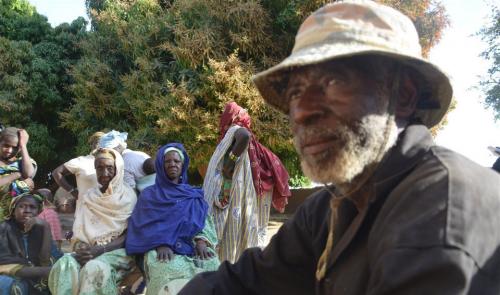Mali: UN genocide adviser warns of reprisals against Tuareg and Arab populations
A senior United Nations official today warned of the risk of reprisal attacks against Tuareg and Arab civilians in various regions of northern Mali and urged the country’s military to protect all citizens regardless of their ethnic affiliation.

In Diabaly, Mali, citizens tell of two Tuareg families who were forced to flee their village and are now hiding in the town.
“While the liberation of towns once under the control of the rebel and extremist groups has brought hope to the populations of northern Mali, I am deeply concerned at the risk of reprisal attacks against ethnic Tuareg and Arab civilians,” the UN Special Adviser on the Prevention of Genocide, Adama Dieng, said in a statement.
Fighting between Government forces and Tuareg rebels broke out in northern Mali last January, after which radical Islamists seized control of the area. The conflict uprooted thousands of people and prompted the Malian Government to request military assistance from France to stop the progression of extremist groups.
Mr. Dieng said he was concerned over allegations of human rights violations committed by the Malian army, including summary executions and disappearances, in Sevaré, Mopti, Niono and other towns close to the areas where fighting has occurred. There have also been reports of incidents of mob lynching and looting of properties belonging to Arab and Tuareg communities, who have reportedly been accused of supporting armed groups based on their ethnicity.
“I am deeply disturbed by reports of violations committed by the army, and by reports that the armed forces have been recruiting and arming proxy militia groups to instigate attacks against particular ethnic and national groups in northern Mali,” Mr. Dieng said.
“I call on the Malian army to discharge its responsibility to protect all populations, irrespective of their race or ethnicity.”
Last month, the Prosecutor of the International Criminal Court (ICC), Fatou Bensouda, opened an investigation into alleged crimes committed in Mali since January 2012 – including murder, torture and rape – with a focus on the northern part of the country.
Mr. Dieng welcomed that decision and urged all parties in the country to adhere to international humanitarian and human rights law.
Meanwhile, the UN High Commissioner for Refugees (UNHCR) today warned that while many displaced people are eager to return home, reports of unrest and revenge attacks against Tuaregs and Arabs, as well as closed roads and a lack of bus services to certain cities, are posing challenges for them to return safely.
“In the capital, Bamako, we have interviewed displaced families who say they are ready to return to their homes in the Gao, Timbuktu and Kidal regions, as soon as the roads to the north are re-opened,” UNHCR spokesperson Adrian Edwards told reporters in Geneva.
“Shortages of food, fuel and electricity, as well as disruption to basic services such as health and education, are also mentioned by those people who at present prefer to wait and see before returning to the north.”
Many internally displaced people have reported that their houses in the north have been damaged or destroyed and families with children attending schools in Bamako said they will not return to the north after the end of the school year in June.
Another concern is the presence of anti-personnel landmines and unexploded ordnance threatening the civilian population and aid agencies hoping to help them, Mr. Edwards said.
UNHCR also reported that Malian refugees continue to cross into neighbouring countries to flee the fighting or because of fear of reprisals.
Source: UN News
- 427 reads
Human Rights
Ringing FOWPAL’s Peace Bell for the World:Nobel Peace Prize Laureates’ Visions and Actions

Protecting the World’s Cultural Diversity for a Sustainable Future

The Peace Bell Resonates at the 27th Eurasian Economic Summit

Declaration of World Day of the Power of Hope Endorsed by People in 158 Nations

Puppet Show I International Friendship Day 2020

